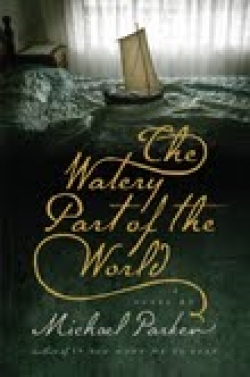The Watery Part of the World
In 1970, Yaupon Island is down to three inhabitants: Maggie, Whaley, and Woodrow, who make up half of Michael Parker’s novel, The Watery Part of the World. The other half begins in 1813, when pirates capture and spare Theodosia Burr Alston, who starts a new life on the same island. Those who remain a century and a half later are her last two descendants and the man who cares for them. This novel holds a mirror up to the past and explores how it shapes the present, as each character struggles with life in this wind-ravaged place, which seems to possess its own gravity.
Parker has written four previous novels and two short-story collections and has received numerous honors and awards. He currently teaches in the MFA Writing Program at the University of North Carolina in Greensboro. An accomplished storyteller, both his talent and skill shine in this newest creation. The story loops back on itself many times, yet every retelling lays bare a new thread, as each character gives his or her own take on the island. Though in Whaley’s case, “she tended not to recognize but the one, her own, for the others seemed to her soggy and vulnerable places, no more secure than driftwood tossed about by the waves.”
Uncertainty is the way of life here. As Maggie says, “This place seemed to have something against the notion of forever. Everything felt so borrowed; it was hard not to be skeptical of anything lasting longer than a season.” But despite her seeming disdain for her home, Maggie refuses her lover’s offer to leave with him for she feels that, like Theodosia before her, she has become inextricably bound to the island. She knows her lover won’t understand, since “he’d only been born over here, not raised, he’d not known it long enough to become it.”
This is a story of want and stubbornness, of trust and what happens when you break it, of people struggling to keep living the only lives they know. As the narrator says of Theodosia, “Like the tree the island was named for, she bent to survive.” But this is also a story of love—messy, flawed, and human. Love for oneself, for others, and for a place one might never have wanted to be but eventually comes to need more than breath. To whatever end, these people triumph, as resilient as their island, “the crust of a continent defying the overwash and daring a wind to take it away.”
Reviewed by
Jessica Henkle
Disclosure: This article is not an endorsement, but a review. The publisher of this book provided free copies of the book to have their book reviewed by a professional reviewer. No fee was paid by the publisher for this review. Foreword Reviews only recommends books that we love. Foreword Magazine, Inc. is disclosing this in accordance with the Federal Trade Commission’s 16 CFR, Part 255.

